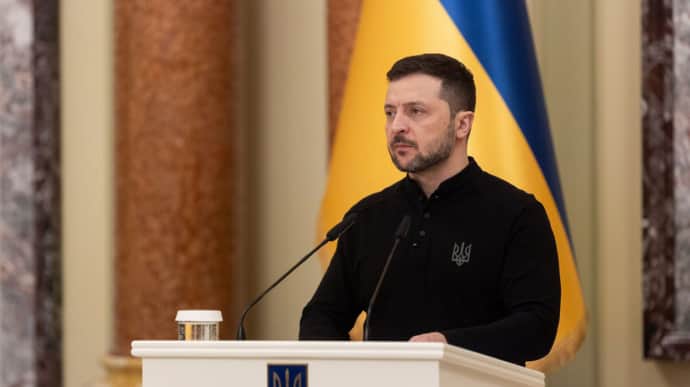
Foreign
Volodymyr Zelensky’s exit deal: NATO membership or bust?

Ukrainian President Volodymyr Zelensky has made a bold offer that’s grabbing headlines worldwide. On February 23, 2025, Zelensky announced he is willing to step down from his presidency if it secures Ukraine’s membership in NATO.
This dramatic proposal comes as the war with Russia nears its third anniversary, with peace talks heating up and NATO membership remaining a hot topic. Zelensky’s statement has sparked debates about Ukraine’s future, Russia’s reaction, and what this could mean for European security.
The offer reflects Zelensky’s deep desire to ensure lasting peace for his war-torn country. With NATO membership seen as a shield against Russian aggression, his readiness to resign shows just how much he’s willing to sacrifice. But will this gamble pay off, or will it stir more tension in an already volatile situation?

Volodymyr Zelensky’s Resignation Offer: What’s Behind It?
Zelensky dropped this bombshell during a press conference in Kyiv, just a day before the third anniversary of Russia’s full-scale invasion. “I am ready to exchange my resignation for Ukraine’s NATO membership,” he said, his voice steady but firm. He added that he doesn’t want to cling to power for decades, pushing back against claims from critics like U.S. President Donald Trump, who once called him a “dictator.” Instead, Zelensky framed his potential exit as a selfless act to bring peace and security to Ukraine.
For months, Zelensky has been vocal about NATO membership as the key to ending the war. He believes joining the alliance, where an attack on one member is an attack on all, would deter Russia from future invasions. But NATO has hesitated, wary of provoking Moscow further. Zelensky’s offer to step down could be a game-changer, putting pressure on Western leaders to act. It’s a high-stakes move that’s got everyone talking—from Kyiv to Washington to Brussels.
Why NATO Membership Matters to Ukraine
Ukraine’s push for NATO membership isn’t new, but it’s taken on fresh urgency as the war drags on. Since Russia annexed Crimea in 2014 and launched its full invasion in 2022, Zelensky has argued that NATO is the “cheapest way” to guarantee Ukraine’s safety. Without it, he’s warned, Ukraine’s army would need to double in size to fend off Russia—a costly and risky prospect.
The idea of NATO membership has split opinions. European leaders like UK Prime Minister Keir Starmer have called Ukraine’s path to NATO “irreversible,” while others, including some in the U.S., see it as unrealistic. Russia, meanwhile, has made it clear it won’t tolerate NATO forces near its borders. President Vladimir Putin has long opposed Ukraine joining the alliance, fearing it would bring Western military power too close to home. Zelensky’s offer to resign might be his way of forcing NATO’s hand—or at least keeping the conversation alive.
| RELATED NEWS: |
| President Trump demands Ukraine return U.S. aid money |
| Kash Patel confirmed as FBI Director: A new era begins |
| Tel Aviv shaken as 3 bus explosions spark terror fears |
The War’s Toll and Zelensky’s Leadership
Zelensky’s leadership has been a cornerstone of Ukraine’s resistance since the war began. Elected in 2019 with a landslide victory, he’s guided the nation through unimaginable hardship—Russian drone attacks, power outages, and the loss of countless lives. Today, Ukraine remains under martial law, with elections on hold as the fighting continues. Yet, Zelensky’s approval ratings have reportedly dipped, and critics like Trump have seized on this to question his legitimacy.
Despite the challenges, Zelensky’s resolve hasn’t wavered. His latest offer shows he’s thinking beyond his own tenure, focusing on Ukraine’s long-term survival. “If you want me to leave my post as soon as possible, I am ready for that,” he told reporters, signaling his readiness to put his country first. It’s a rare moment of vulnerability from a leader who’s become a global symbol of defiance.

Reactions Pour In: Support, Skepticism, and Fear
The world wasted no time reacting to Zelensky’s proposal. In Ukraine, some see it as a noble sacrifice, while others worry it could weaken the country at a critical moment. On X, users debated fiercely. One post called it “a desperate play for peace,” while another warned, “Russia won’t accept NATO anyway—hello WWIII.” The sentiment reflects the high stakes of Zelensky’s gamble.
Internationally, responses are mixed. European leaders like France’s Emmanuel Macron have stressed that only Zelensky can negotiate for Ukraine, hinting at support for his NATO push. But in the U.S., where Trump has clashed with Zelensky, the mood is cooler. U.S. Defense Secretary Pete Hegseth recently said Kyiv joining NATO was “unrealistic,” casting doubt on whether Zelensky’s offer will sway Washington.
Russia’s reaction, unsurprisingly, has been icy. Foreign Minister Sergei Lavrov called NATO troops in Ukraine “completely unacceptable,” suggesting Moscow would view Zelensky’s plan as a provocation. With peace talks already fragile, this could throw another wrench into the process.
What’s Next for Ukraine and NATO?
Zelensky’s offer raises big questions. Will NATO bite, or will it stick to its cautious stance? If he resigns, who would lead Ukraine through the next phase of the war? And how will Russia respond if NATO membership moves forward? For now, the answers are unclear, but one thing is certain: Zelensky has put the spotlight back on NATO and Ukraine’s place in it.
As the war’s third anniversary looms, the world watches closely. Zelensky’s willingness to step aside could mark a turning point—or a risky misstep. Either way, it’s a reminder of the human cost of this conflict and the lengths one leader will go to protect his people.




























